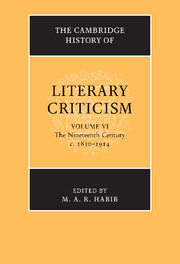Book contents
- The Cambridge History of Literary Criticism
- Series page
- The Cambridge History of Literary Criticism
- Copyright page
- Contents
- Notes on contributors
- Acknowledgements
- Introduction
- I Literary criticism as an institution
- II National developments in literary criticism
- 4 Literature and nationalism
- 5 Germany
- 6 France: the continuing debate over Classicism
- 7 England: Romantic legacies
- 8 England: literature and culture
- 9 Literary nationalism and US Romantic aesthetics
- 10 Russia: literature and society
- III Critical movements and patterns of influence
- IV Later nineteenth-century developments: Realism, Naturalism, Symbolism and Decadence
- V Some major critics of the period
- VI Genre criticism
- VII Literature and other disciplines
- Select bibliography and further reading
- Index
6 - France: the continuing debate over Classicism
from II - National developments in literary criticism
Published online by Cambridge University Press: 05 February 2013
- The Cambridge History of Literary Criticism
- Series page
- The Cambridge History of Literary Criticism
- Copyright page
- Contents
- Notes on contributors
- Acknowledgements
- Introduction
- I Literary criticism as an institution
- II National developments in literary criticism
- 4 Literature and nationalism
- 5 Germany
- 6 France: the continuing debate over Classicism
- 7 England: Romantic legacies
- 8 England: literature and culture
- 9 Literary nationalism and US Romantic aesthetics
- 10 Russia: literature and society
- III Critical movements and patterns of influence
- IV Later nineteenth-century developments: Realism, Naturalism, Symbolism and Decadence
- V Some major critics of the period
- VI Genre criticism
- VII Literature and other disciplines
- Select bibliography and further reading
- Index
Summary
- Type
- Chapter
- Information
- The Cambridge History of Literary Criticism , pp. 139 - 153Publisher: Cambridge University PressPrint publication year: 2013



